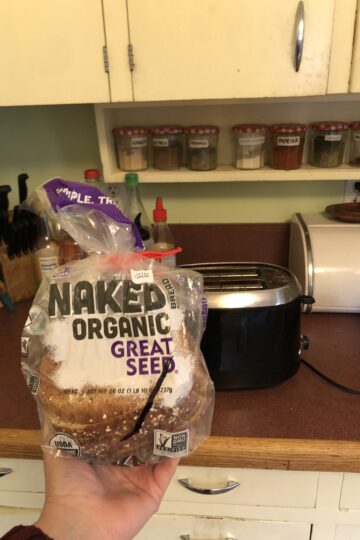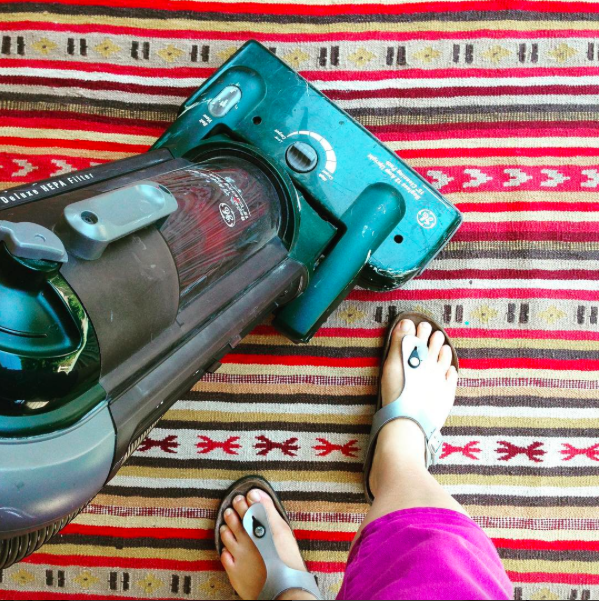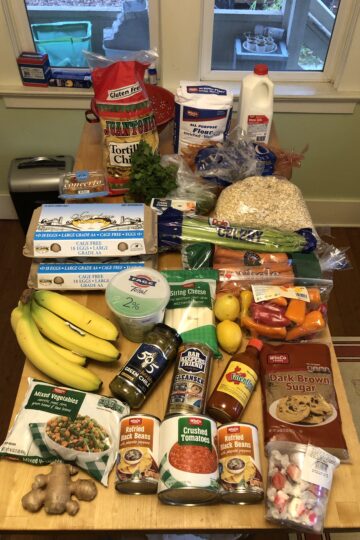Is Frugality the New Norm?
I gave an interview today about frugality, and the reporter asked me whether I thought the current interest in frugality would last beyond the recession. I answered that although I thought some of the folks who were discovering the joys of living a rich life on little money would stick with it, that the majority of Americans would be happy to resume free spending once the economy picked up again. This answer surprised the reporter, and it stuck with me the rest of the day.
Will living through the current recession bear long lasting changes in consumer behavior long after the paychecks start rolling off the assembly line again?
Having just finished Lauren Weber's In Cheap We Trust: A Story of Misunderstood American Virtue, I had fresh in my head how Americans have repeatedly been happy to shed the deprivation of frugality when it's paired with poverty. Sure, there are many who continue on with a lifetime of frugal and non-wasteful lifestyles, but they are the exception rather than the rule.
But then I started to think about how the current wave of frugality is now paired with green living, which is a first. The sustainability component may be the X factor that's been missing from other eras of American frugal living. The ingredient that keep people staying the course, even after their finances loosen up.
This wave of frugality may actually stick.
What do you think? Is your frugality here to stay? Will you start up with big spending as soon as we weather the current economic storm? Please share your thoughts in the comments section below.
Katy Wolk-Stanley
"Use it up, wear it out, make it do or do without."





I don't think it's going to last either. Being extravagant is too easy, plus being showy and keeping up with the Joneses is hard-wired into our psyches: it shows we're high-status individuals. It only takes one or two Joneses to infect a whole neighborhood.
Bet you that instead of less initial buying, most people will buy expensive "green" products and throw out less stuff. The former is of mixed use. One the one hand you can make your own green cleaning products. On the other there's a huge number of products we can't make ourselves and certainly can't make better ourselves, such as low-VOC paints. Throwing out less stuff is good, and particularly useful for people who don't want to buy new - better quality cast-offs!
Further, manufacturers have realized that they can save money by being cheap. For example, less-diluted laundry detergent and refill bottles for cleaning products which are cheaper because they don't have the pumps.
So while I don't think frugal is going to last, I do think that some of the advances in sustainability will persist.
I try to live a frugal as possible. I just wish I could figure out how to stay on track with it. I work 12 hour shifts (some 6-day weeks) in a factory, leaving very little time to take care of home and self. I am single and live close to work so I am very fortunate but I still have a hard time of it. Making my situation even worse is the fact that I work for a Japanese company so everyday I am taught to "save time, save space, save energy, save the planet, save, save, save!". But then I come home and it all gets blown out the window as I cram unhealthy food in my mouth, throw things in the waste can that I should be recycling and so on and so forth. Food waste is a big problem with me as I buy healthy with good intentions but then can't find time to prep it so end up eating bad and tossing the good 🙁 Does anybody have any suggestions for somebody like me?
Since you asked for suggestions...
Most importantly, don't try to do everything at once. You work a punishing schedule, cut yourself a break on the home front.
I suggest deciding on a single goal to work on. Let's say you pick eating better. Focus on that and don't worry about recycling, or being more frugal (assuming you're living within your means), or anything else. What helps you eat better? For some people it's not having junk food in the house. For others it's having a lot of the good stuff on hand, even though it means throwing out some of it. For yet others it means knowing how to cook - nothing fancy but enough so you can make healthy food. It might mean buying a lot of food from the pre-made counter because the store's salad, cut fruit and roasted chickens are your healthiest options right now.
If you want to, you could pick a goal and then ask for help achieving it. I used eating just as an example - I have no idea what goal you want to achieve first.
Mastering even one of your goals is a significant achievement. It takes effort to develop the skills and habits that make such things a routine part of one's life. The good news is that habits are hard to break, so if you develop good habits (say, having a good breakfast every day) you'll probably stick with them.
After you achieve one of your goal, then you can move on to another. And remember: baby steps! Small improvements are better than none at all.
Thank-you, WilliamB! You are right. I am trying much too hard to accomplish it all in one fell swoop. I must admit, I'm not accomplishing anything on the home front. I'm going to try to focus on the baby steps and not the big picture. Thanks for the suggestions 🙂
Y0u could try to prepare a bunch of meals ahead of time when you have a bit of free time and freeze them, then get them out to put in the oven or microwave when you need them.
It is easier to make one mess and fix multiple meals just once a week than to try to do it everyday.
I agree, it is best to make one change at a time. Trying to do too much can be overwhelming.
Try making a list of what you want to do and then decide what is most important and work on that first.
Good Luck!
Growing up, my family had very little money so frugality was instilled in me at an early age. Aside from a few free-spending years, I have been on this path for most of my life. It's freeing, and that's not a feeling I ever want to trade in.
I wonder if true fear can also be an X factor that makes frugality stick. My grandmother was 15 when the Depression began, and she is one of the only people I know who truly eschews clutter and extra spending. She never wants to live with that kind of fear again. The current generations haven't lost everything (yet); maybe we just haven't really been frightened enough.
I think humans are fickle creatures and frugality won't stick until we change the very paradigms that prop up our consumer culture. It will take collective fear--or even collective anger--to put our foot down and say "No more."
I started my simple living several years ago. At first it was just to clean out the clutter, that felt so good I just kept going. Buying from resale shops, recycling. Buying local & having my own organic garden has become my main focus. I've found lots of inspiration & help from my local public library. We have a local sustainability group in our town & we encourage each other.
I hope more people will join us but in our area it seems like bigger & faster is still better. I love your blog Katy, thanks for all the great ideas.
I just a read a fantastic book called "Cheap: the high cost of discount culture" by Ellen Ruppel Shell. Not sure if you've read it already, but I think you'd really like it!
Cate, I liked that one too.
It won't last, lol. I'm reading that book too. To quote my favorite thrift author "Frugality without creativity is deprivation" ~~~Amy Daczyzyn. To live a simple, frugal lifestyle you have to want to do it for more reasons than just saving money. Personally I find a certain amount of freedom in a simpler life, plus more opportunities to create things of value for myself and my family. Now that I'm *trying* to follow the Compact, I am actually reading books and journaling and doing art again, for example, instead of frittering my free time, and money, away with trips to the stores. But for a lot of people, who are trained to express themselves through shopping, console themselves through shopping, socialize through shopping and show love with the things they buy, thrift is just deprivation.
I don't think it's going to stick either. For some maybe, but not for most. I think the essence of being "green" does fit with being frugal, but some things don't mixed, like buying organic food, for one. I've recently had to eat few organic fruits, vegetables & meat to cut our budget down. Instead I try to just focus on the dirty dozen. It may also get a little harder to be frugal once companies stop tailoring things to the frugal and some article about "saving money" isn't on the front of every magazine.
I think it will stick, at least for some time to come - like decades, not a few years. Here's why:
Even when the economy heads into real recovery, we're not going to recover the level of affluence and easy access to credit we had before the crash. That party is over. It wasn't sustainable from a financial perspective, and I think a lot of individuals and corporations and government types have woken up to that.
For me, and I think for a lot of people, the new frugality movement is really driven by a desire to live sustainably in a planetary sense too. I'm making choices that save me money by lessening my consumption and therefore my impact on the planet.
In better economic times, I would spend more to further that agenda by, say, paying a premium for more organic groceries. But I'm not going to bury my head in the sand and start buying a lot of plastic crap again just because my husband gets a raise or I pick up a new freelance client.
And I'd like to think I'm not alone.
I have been frugal long before it started to be socially acceptable. I don't think people only doing it because of the recession will continue past that. Some people would rather have the latest than be prepared for bigger better things. While my peers have their eyes on flashy cars I keep my eyes on foreclosures that are in the same price range as that car, But will generate income for me. But to eaches own!
Necessity is the mother of invention...I'm sure we've all heard that old phrase. Increasing frugality is an offshoot of financial necessity. Personally, I doubt that the economy will ever improve to the point that it was pre-recession. Whenever it does rebound, even to a lesser degree, I'm certain that the frugal ways of most people will be cast aside. This generation has been raised on the myth that more is better, that new and shiny is better, and that they deserve instant gratification. The only exception to this group will be the ones for whom frugality has brought them a feeling of security and peace of mind...and maybe those who have lost most of their earthly goods.
What Sierra #11 said.
Lots of people talk about creating a new, sustainable (and yes, frugal) lifestyle. This implies that the old lifestyle of affluence, like the economy that made it possible, WAS NOT SUSTAINABLE. Think about the consequences of that statement for a moment.
Now consider the current economic situation.
The old economy wasn't sustainable. This implies that it would have an end. I have a strong suspicion that right now is the beginning of that end.
So, I think frugality is going to become the new norm. And it's up to us to make it COOL!
I'm not so sure that the current popularity of "going green" can translate into long-term frugality. Many of the ways that trendy greenness manifests itself are superficial and actually not financially prudent. (I'm specifically thinking of the practice of buying expensive gadgets made to be "earth-friendly" instead of reducing, reusing and recycling).
But maybe I'm just a pessimist. Vive le thrift (and, btw, thanks for the t-shirt!)
I think it will and it won't. I have always been frugal, I was raised that way. But it was and is out of necessity. I do these things so I have enough, barely, to pay the mortgage every month and have money left over for food. We have one car, paid off. No cable, one 13in TV with no antenna, library videos only. Line dry wash, heat up to 62 max, and only when the kids are awake. We are getting rid of and plan on staying out of debt from now on, because we can't pay the bills. I spend a mere 65$ a week on food, plus our WIC checks. So yeah, if the economy, and my husband's job pay better, I would like to be able to spend a bit more on groceries, and not wonder if I should get toilet paper this week, cuz then I can't afford laundry detergent. But I will still do my shopping at Goodwill cuz I love seeing how far I can make 20$ go. I am not going back to walmart and other stores for new if I can help it, but I didn't do that before. Yes we do need another car, something bigger so I can get all three kids in their car seats safely, they don't in the car we have now, but it is our only car. But that car when we can get it, will definitely be second hand. I like being this way and celebrate the finds I make. It lets me stay home with my kids, two of whom are autistic, so I can keep our family healthy and happy. I wanted this kind of frugal life before I had a family, and I wouldn't change it now. Although I would like to be able to buy more groceries!
For us, thrift is good stewardship, so it is tied to our sense of faith. Having been thrifty, when everything came tumbling down, we weren't desolate. I already had ways to manage on very little! We won't be going back, because we were never there!
I started this frugal journey before the economy tanked and I'm not planning on giving it up if and when it gets better. My kids are learning by my example, which I believe will only help them in the future.
I was frugal before frugal was cool, hip, trendy or green. It is the way I have always lived and always will live.
"Money is something you trade your life energy for. " If I'm trading my limited hours of life and breath for money, I'm going to make it stretch.
I doubt we will ever go back to the "good old days" of endless shopping simply because the world is running out of the basics with which to make things. There is only so much oil to be used for energy, medicine, plastic, fertilizer etc. As more people raise their standard of living and demand more consumer goods there will not be enough to meet all the demand.
What is true for oil is true for so many other materials that we need to fuel our throw away lifestyle. Population is supposed to rise by 50% by 2050 and there is no way the earth can sustain that many people. We will become frugal because we have no choice. Only the very rich will be able to sustain a free spending lifestyle.
If we can make the change to a simpler life we will all be happier and healthier, but I fear we will try to make the old ways return and that will simple make the change, which is inevitable, that much more difficult.
I disagree with your population prediction. However, your point is valid about limited resources.
see "The Next 100 Years" by George Friedman
or the United Nations website
I think it depends on where you live, and whether you will get access to easy credit again(I hope NOT! I hope credit cards get harder to get, but I don't think that will happen. My 18 yo daughter gets credit card offers weekly, as does my 15 yo son!).
If you live in an area where frugality is more the norm(like my state of ND), then it is easier to become more frugal, even if you are a young family who overspent. You have support to be frugal.
On the flip-side, when I go back to So. Cal to visit my family, I feel hopeless that there will be any real change. Such a huge "keeping up with the Smith or Jones, etc" I think the attitude to keep up or one up is really ingrained, and I don't know if that will ever change unless it continues to be difficult to get credit.
I don't think the economy is going to bounce back. Our national debt is sickening. The debt in NJ is awful. I think we have to be collectively angry and frugal and insist our law makers find ways to cut waste. The debt to China is scary, if we default just once, the stock market would plunge. We buy all this crap from China, because we kissed our manufacturing goodbye. Cheaper to have somebody else to make it. Our politicians fight each other instead of attacking our problems. I am an optimistic person but lately I really, really wonder how we are going to regain a healthy economy!!
Amy, I agree with you. I'm Canadian, and live in the Province of Québec, where I have the privilege of paying the highest taxes in all of North America. Health care and education is highly subsidized, and we now have a $7 a day provincial day-care program. But we are broke, and are on the verge of having a major melt-down, as we have one of the highest numbers of baby boomers who are going to massively leave the work force into retirement beginning in 2012. I have no idea how we are going to finance all our public services: taxes cannot go up here, and our health care expenses are skyrocketing. We need to make the difficult choices now, not later, because our children, and perhaps even us, will have to make untenable ones. I think the economist Peter Schiff offers smart, but very hard solutions.
Hope TINA keeps NonConsum... informed on her efforts on cheap/green eating. Go TINA!
I think those who considered the sustainability aspect of thrift were actually thrifty and green way before the recession occurred, and will continue to be so once the economy turns around. One thing that I think has been gained and will perhaps remain once the economy picks up is the distinction between frugality and cheapness. I think the people who will remain frugal, of those who recently adopted the behavior out of necessity, are those who have been deeply touched be the recession, especially those with children to support. My husband and I bought our house in 1990, and were hit by a deep recession in 1992-1992. My husband was laid off on three occasions during that period and on the last occasion, he found a job only a few weeks before his unemployment benefits ran out. We had a baby I was nursing and a preschooler at the time, and I was not in a position to help out job-wise apart from babysitting. Thankfully, we only had a modest mortgage and a small car loan to pay at that time, and no consumer debt, or else we would have been in deep trouble. That experience made me realize that even with the best intentions and hard work, crap happens. I felt really vulnerable during that period and it made a huge imprint on me. Although our revenue has grown a lot since then, we have remained modest in most areas of our lives, and I will never, ever, forget those times.
Good point! I think another category of people that would fit in your theory are those who have never had to deal with losing their jobs before, thus were more free, and I would say from personal experience, more irresponsible with their money.
My husband retired from the Air Force 3 years ago. This is the first recession that we have paid any attention to in our almost 22 years of marriage, because it never touched us, or our families in that time.
While we live in an economic bubble up here, it is now on our minds that job security doesn't exist anymore. That is what kicked us in the rear to get serious with how we spend.
I think people in the same situation as my husband and I, are going to be more frugal out of shock of a totally different lifestyle.
Most of our friends are now retired as well, and they all find themselves with the same attitude as we have..."wow, we could lose our jobs. We had better watch our spending"
My frugality will last!
Personally, I am sure my frugality will last too. The changes I am making are more than just financial, or environmental, or lifestyle - all three are tightly entwined as I move towards a new way of living. I am not in the USA and here in Australia the recession hasn't hit us as hard, but my personal family situation has been hard for some time, and I am far more motivated by the need to support my family in a sustainable way.
As for the rest of the western world, I have no idea. I think there is this shift towards a more sustainable future, we just need to figure out how to merge the current digital age with the way things were before the world wars, when consumerism really seemed to get out of hand.
I also follow a compact of sorts, and have bought nothing new in the past nine months other than lady underthings and a few baby things that needed to be new. My reasons, like you, have been both frugal and environmental. And while this has been become a way of life for me, I don't think it will stick on a mass level. People seem to want to get back to shopping, spending and eating out at the same level they did before to feel like their "old selves" again. I don't think the connection has been made in the general public that a high level of spending + waste = economic downturn and environmental problems. And I don't understand why. It's like the dieter who once they hit their goal weight, starts eating cookies again.
"It’s like the dieter who once they hit their goal weight, starts eating cookies again."
And yet, that is the common pattern.
Personally, my hubby and I are committed to our frugal ways.
Nationally, I think it depends on whether or not the economy bounces back. I'm not sure it will. I think we may in for a "new normal" of fewer, lower paying jobs.